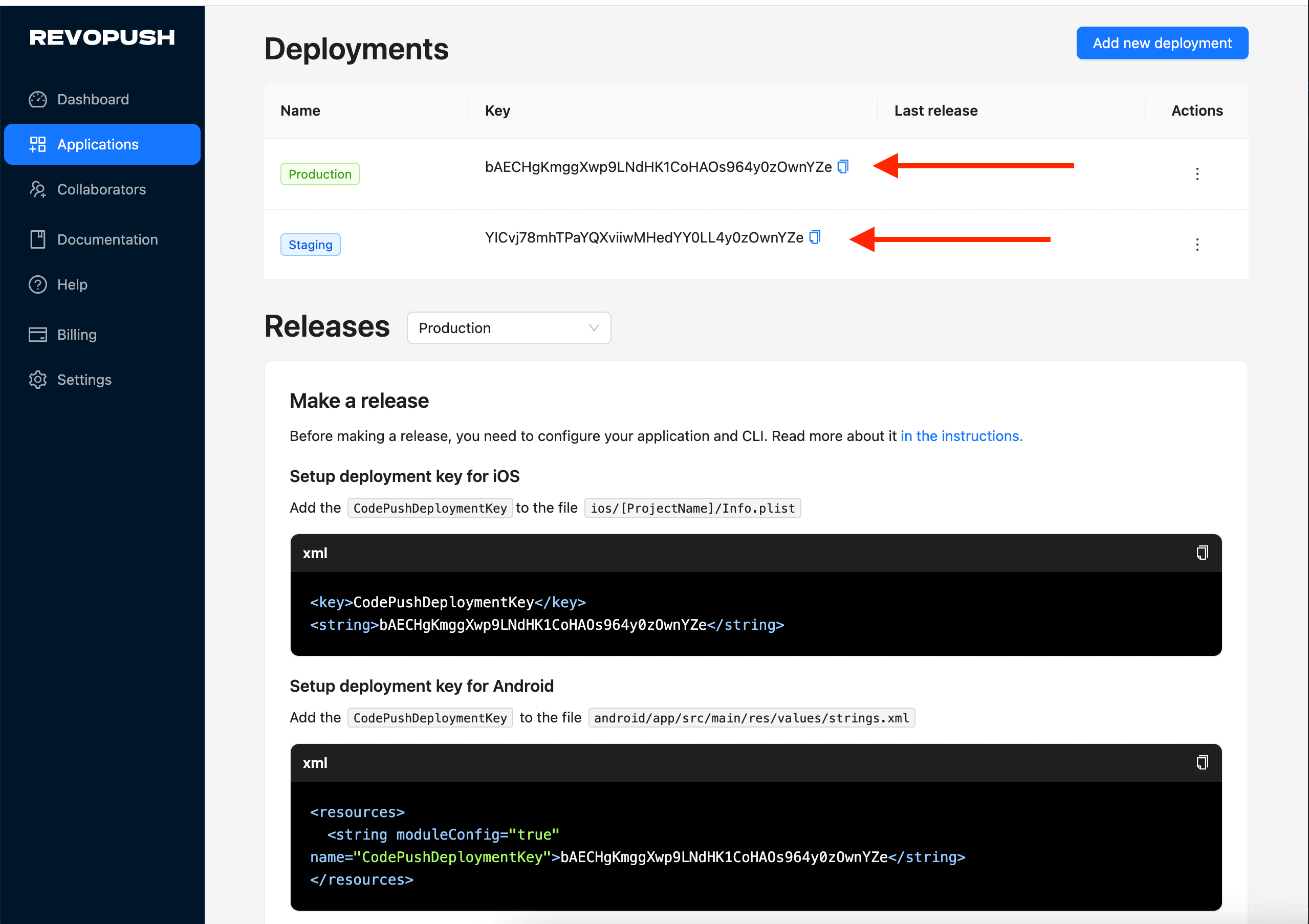Reproducing an Issue with Revopush SDK on a Specific React Native Version
This guide will help you to setup clear React Native application with specific version and configure Revopush SDK. We expect you already configured your Revopush account before. If no follow Revopush getting started guide
Create CLI application
Create a new project using the React Native CLI. Make sure to use the CLI version compatible with your target RN version RN CLI Compatibility
npx @react-native-community/cli@15 init rn76 --version 0.76.9Navigate into the project and install the Revopush SDK:
npm install --save @revopush/react-native-code-pushConfigure Revopush SDK
Configure the SDK for your target platform:
iOS configuration
Go to the ios/[ProjectName]/AppDelegate.swift and replace:
import CodePush
override func bundleURL() -> URL? {
#if DEBUG
RCTBundleURLProvider.sharedSettings().jsBundleURL(forBundleRoot: "index")
#else
Bundle.main.url(forResource: "main", withExtension: "jsbundle")
CodePush.bundleURL()
#endif
}Go to the ios/[ProjectName]/AppDelegate.mm and replace:
#import <CodePush/CodePush.h>
- (NSURL *)bundleURL
{
#if DEBUG
return [[RCTBundleURLProvider sharedSettings] jsBundleURLForBundleRoot:@"index"];
#else
return [[NSBundle mainBundle] URLForResource:@"main" withExtension:@"jsbundle"]; // [!code --]
return [CodePush bundleURL]; // [!code ++]
#endif
}Android configuration
Go to the android/app/build.gradle and add:
apply plugin: "com.android.application"
apply plugin: "org.jetbrains.kotlin.android"
apply plugin: "com.facebook.react"
apply from: "../../node_modules/@revopush/react-native-code-push/android/codepush.gradle"Then apply changes to MainApplication.kt in the android/app/src/main/../MainApplication.kt
import com.facebook.react.soloader.OpenSourceMergedSoMapping
import com.facebook.soloader.SoLoader
import com.microsoft.codepush.react.CodePush
class MainApplication : Application(), ReactApplication {
override val reactNativeHost: ReactNativeHost =
object : DefaultReactNativeHost(this) {
override fun getPackages(): List<ReactPackage> =
PackageList(this).packages.apply {}
override fun getJSBundleFile(): String {
return CodePush.getJSBundleFile()
}
override fun getJSMainModuleName(): String = "index"
}
}After you configure your React Native application go to app settings to get Deployment keys:

Setup deployment key for iOS
Add the CodePushServerURL and CodePushDeploymentKey to the file ios/[ProjectName]/Info.plist
<key>CodePushServerURL</key>
<string>https://api.revopush.org</string>
<key>CodePushDeploymentKey</key>
<string>YOUR_DEPLOYMENT_KEY</string>Setup deployment key for Android
Add the CodePushServerUrl and CodePushDeploymentKey to the file android/app/src/main/res/values/strings.xml
<resources>
<string moduleConfig="true" name="CodePushServerUrl">https://api.revopush.org</string>
<string moduleConfig="true" name="CodePushDeploymentKey">YOUR_DEPLOYMENT_KEY</string>
</resources>JS Configuration
Configure the SDK in the JavaScript layer of your app (minimal setup):
import codePush from "@revopush/react-native-code-push";
class MyApp extends Component {}
MyApp = codePush(MyApp);More details: JS SDK API
Setup CLI
Install the Revopush CLI and log in:
npm install -g @revopush/code-push-cli
revopush loginMore on CLI setup: Getting Started with CLI
Create your app in the Revopush UI or via the CLI and copy the deployment keys into your app configuration. Enable logging to help identify potential issues: Debugging & Troubleshooting Guide
Run application in release mode
Run the app in Release mode on an emulator or real device:
npx react-native run-ios --mode Release --no-packager
npx react-native run-android --mode Release --no-packagerThis ensures the app doesn't rely on the local Metro bundler and uses the deployed update instead.
Make test release
Release an update using the Revopush CLI:
revopush release-react <APPLICATION_NAME> android -d <DEPLOYMENT_NAME> --mandatory
revopush release-react <APPLICATION_NAME> ios -d <DEPLOYMENT_NAME> --mandatoryMore on releasing updates: Releasing with CLI
Check logs for errors or confirmation of the new release being applied.